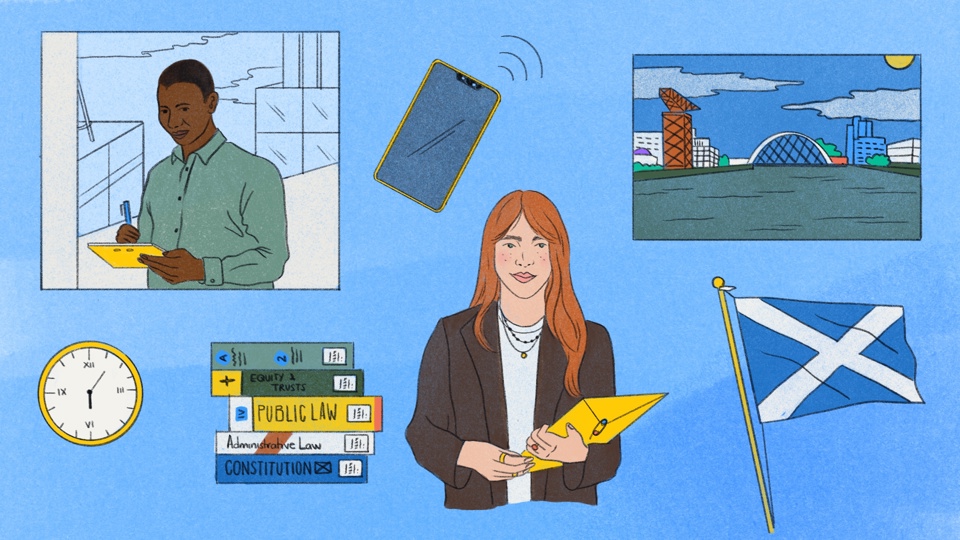Lawfluencers, Nomads, Reels and Deals — Gen Z and their non-traditional routes into law

Ellie Philpotts explores alternatives to traditional legal structures, such as ‘lawfluencing’, and how they offer practitioners the space to create their own path and build resilience in the profession
The Scottish legal system may be over 1,000 years old, but its members know how to adapt to the times. Gone are the days of being chained to a desk; instead, working lives appear more unpredictable by the year. Still, standards are followed, and just as much – if not more – good-quality work gets produced.
Across both Scotland and practices, experienced lawyers and the next generation alike have been busy redefining their roles.
When dealing with briefs, you need to think fast while retaining the values that stand the test of time. More widely, the same is true of law, revered for its malleability. Even if companies such as McGlashan MacKay broadly stick to traditional structures for how they complement legal aid, they often consider different paths too.
Relatively recently, these have extended to ‘lawfluencers’, freelancers, consultants and digital nomads. Lawfluencing, for instance, sees lawyers hone big presences, largely online. However, while typical influencers are associated with purchasing products and adapting general behaviours, lawfluencers are likely sharing advice, insight and community support – yes, all within law. And, representative of the digital age and craving more autonomy over work/life balances, lawfluencing is emerging as a more attractive consideration for many.
How to lawfluence
Nadia Cook is one example. Four years ago, the now-associate at Dentons established The Scottish Lawyer to “demystify the legal world” and by 2023 was among AllAboutLaw’s Top Lawfluencers. Cook remains driven by how “daunting” traditional paths can feel, especially if, like her, you do not have a family background in the profession.
She tells The Journal: “I have carved a path blending traditional legal practice with a wider mission: increasing access to the profession through social mobility and transparent content. I see no conflict between these – my work at Dentons gives on-the-ground insight, which I translate into accessible guidance for aspiring lawyers.”
She continues: “The rise of lawfluencers, freelancers, consultants and portfolio careers reflects a significant shift. These options can appeal to those seeking greater flexibility, entrepreneurship or time to champion causes. Lawfluencing enables professionals to share knowledge, challenge stereotypes and build bridges between the legal sector and the public. Variety can dismantle barriers that historically restricted entry to and progression in law, especially for people from underrepresented backgrounds.
“Whether you are inspired by advocacy, creative content, community work or corporate transactions, there is space in today’s legal landscape to do both or build your own lane entirely. Scotland’s legal future will be shaped by people who bring authenticity, adaptability and ambition. The more we diversify what it means to ‘be a lawyer’, the more inclusive, impactful and resilient our profession will become.”
Making waves
Rupa Mooker agrees that alongside vital traditional legal roles sits the growing capacity for combining law with other disciplines, including content creation and consultancy. “Some may see this shift as departing from the profession’s values, but to me it is expanding its potential,” she explains, referencing her own lived experience.
Mooker spent two decades in employment law, moving within the industry to focus on inclusion, diversity and belonging. She now leads on this at Ashurst in Glasgow.
Presenting community radio once helped her achieve traineeship and since then her broadcasting has evolved alongside her legal career. As such, Mooker regularly informs media listeners about workplace rights and representation.
Believing “law should not live only in courts, tribunals and boardrooms”, she aims to integrate it into the everyday, which she does on screen and off.
“Lawfluencing, freelancing and portfolios open doors to people with different experiences. These might be parents needing flexibility, those with creative interests or people from underrepresented backgrounds who now see other ways to enter the profession. They are welcome moves towards widening access and redefining what success in law can look like,” she says.
From papers to nature
MacArthur Green is one organisation that fuses distinct categories of careers. Solicitors’ days seem indoorsy, but that is only half the deal for Nadia White. The rest of the time she is still hitting the ground running – but this time, literally, in ecology.
White qualified in planning law before discovering environmental consultancy at a Scottish Renewables conference. “Now I have created a blended role – sometimes on client contracts, sometimes as senior ecologist – working on wind farms and training as a habitats surveyor. I am not a five-day desk person, so I find this rewarding,” she reveals.
Starting early?
But what about those early days before making tentative steps into law?
Cook believes anyone can lawfluence, even if they have not started their degrees, let alone secured training contracts. And Lucie Johnston, senior careers adviser at Dundee Law School, increasingly sees students and graduates investigating broader options. With its transferable skill set, Johnston feels solid legal training provides foundations for success in other industries, whether “business, policy, technology or creative-based”.
Sara Akram is a second-year at Strathclyde Law School considering a non-traditional career. She notes that court alternatives such as mediation benefit both non-traditional practitioners and clients, and cites social media as paving the way.
And according to Euan MacKay, partner at McGlashan MacKay, the Glasgow-based solicitors endeavours to give students realistic insights, providing placements to winners of the Sheriff Principal’s Mooting Competition Final, who may have lacked internships otherwise.
Not solely solicitors
This juggle is enveloped into other roles. Constance Trépanier is senior legal caseworker at the Scottish Women’s Rights Centre (SWRC), but did not start out studying law. Instead, her undergraduate degree was in International Development and International Relations, followed by a master’s in Security Studies.
However, with their focus on freedom of movement and human rights, Trépanier’s choices covered legal issues – just more socially and politically.
Ultimately, she began another master’s in Human Rights Law at the University of Edinburgh, one of Europe’s few to not require Law degrees for Law master’s. Now, through parent organisation JustRight Scotland, Trépanier has supported Ukraine Advice Scotland and victims/survivors of gender-based violence at the SWRC and the Scottish Refugee & Migrant Centre.
Of her path and plans, Trépanier reflects: “Non-traditional legal careers make sense here, where educational diversity is an asset.”
(Surf) board meetings
Marrying law with leisure might not seem like plain sailing, but it is amicable enough for Ross Murchison, freelance consultant at Vario, Pinsent Masons’ alternative legal services arm. Aptly freshly back from travelling, Murchison tells The Journal how freelancing facilitates freedom to shape careers around lives, “not vice versa”.
This will not suit everyone, he warns, but is a win for lawyers craving flexibility while nurturing their practice.
Laura Milligan is one of 2,000 others in Vario’s global legal community, which spans jurisdictions, seniority levels and sectors, from paralegals to former general counsels. She echoes Murchison’s sentiment: “Vario’s model, matching lawyers to clients with specific needs for agreed periods, works beautifully as lawyers balance their professional and personal lives in ways optimal for them.”
While each acknowledges challenging ‘rest periods’ and fluctuating income, they demonstrate how freelancing can hold the key for those less financially constrained or struggling with expectations of being permanent.
The Law Society of Scotland’s head of diversity, careers and outreach, Lindsay Jack, also appreciates how high the hurdles can be. She says: “Lawfluencers often have niches, perhaps sharing experiences of aspiring neurodivergent lawyers or someone facing mental health difficulties.
“Freelance/consultancy roles may offer enhanced flexibility, making law more accessible to people requiring more wiggle room in their approach or working hours, but it takes time to build confidence and networks, which not everyone has equal access to. For that, I would say these roles are not, independently, necessarily tools for widening access."
Overall, however, Scotland might be smaller than England and therefore home to fewer lawyers – and lawfluencers. But its legal potential is certainly mighty.











